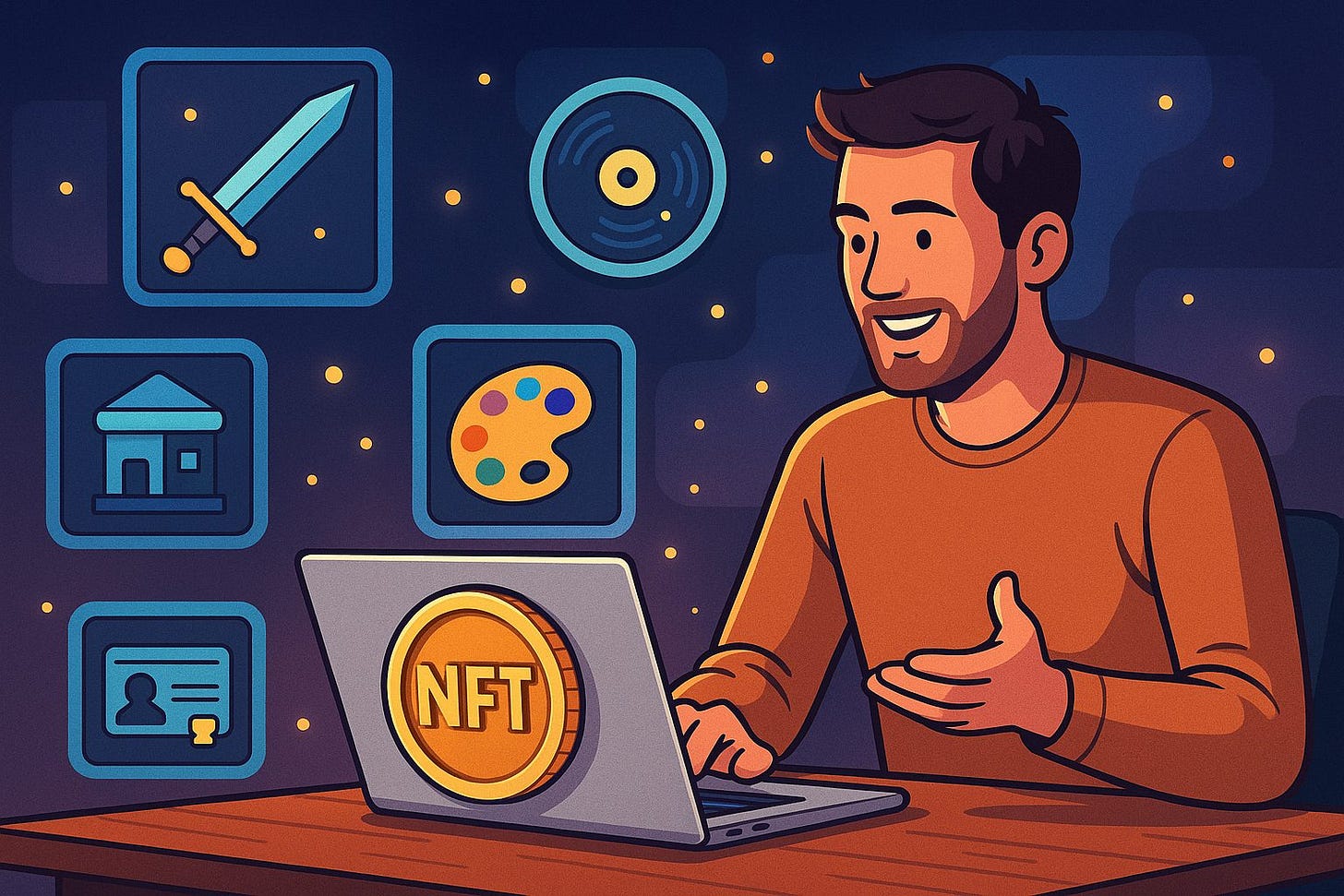5 NFTs You Can Rent Out for Passive Income
Unlocking recurring revenue from digital assets—no fingerprints required
Passive income. You've heard it before. But renting NFTs? That's where the future—and maybe a little magic—happens. Imagine sitting on a collection of rare digital art or in-game loot gathering crypto-earnings—all without lifting a finger. Wild, right? In today's booming Web3 landscape, renting NFTs is rapidly evolving from a quirky experiment into a viable side hustle. Platforms are sprouting, and gamers and collectors alike are tapping into this new rental economy.
This guide dives into five standout NFTs you can rent for passive income. Think of it as wielding a digital Swiss Army knife—flexible, profitable, and a little flashy. 😉
1. Gaming NFTs – Battle-Ready Assets 🎮
Gaming lands are fertile ground for rental income. Rare weapons, skins, and avatars hold tangible value within niche communities. Platforms like GamesPad and miniOrange highlight how NFT rentals function, especially in gaming contexts—listers set rental durations and fees, smart contracts automate usage, and renters enjoy temporary access.
Why this works
Massive demand: Casual gamers can access premium items without buying them.
Recurring revenue: Owners earn every time their asset is rented.
Low barrier to entry: No collateral often required—cryptographically trusted arrangements.
What to look for
Popular games with rental support.
NFTs with in-game utility—power, prestige, or participation.
2. Metaverse Real Estate – Virtual Landlords
Remember "virtual land"? It's real business. Decentraland landlords are already charging monthly rent—reports note plot leasing for notable brands like Heineken and Mastercard , and some virtual landlords pull in thousands monthly. In platforms like Sandbox or Somnium Space, high-traffic locations are hot commodities.
Why it's compelling
Brand partnerships: Companies rent land for events.
Service revenue: Design, build, and leasing—think Airbnb meets the metaverse.
Scalable income: Virtual land operates 24/7.
Key considerations
Location matters: "High-traffic" zones command premium rent.
Platform sustainability: Is the metaverse enviro growing or ghosting?
3. Digital Art NFTs – Exhibit and Showcase 🎨
You're an art curator… sort of. Renting digital art allows galleries, events, or social spaces to display your NFTs temporarily. Smart contracts ensure the piece returns—no glue needed. Exhibition-ready assets are in demand for virtual galleries, social media showcases, or brand collabs.
Why this makes sense
Ongoing visibility for your NFT.
Extra monetization without selling.
Exposure flips: Rent increases notoriety—and its future value.
Smart moves
Appeal to brands or event organizers.
Use collateral-free leases for ease—but not for high-value art.
4. Music & Audio Rights NFTs – Royalty Sharers
Yes, even your tunes can earn rent. Platforms like Royal.io tokenize music rights and let users earn streaming royalties. While not rent in the traditional sense, it's a time-bound revenue share—akin to renting rights to your art.
Why it works
Consistent streaming income for token holders.
Artist-fan connection—fans own a slice, artists pay out.
Portfolio diversification: Add music to your NFT mix.
Watch these points
Royalty deals are real contracts—read them carefully.
Ongoing asset quality matters—song popularity is fickle.
5. Utility NFTs – Subscriptions & Access Passes
Enter the world of "access NFTs"—tokens that grant entry to events, private channels, or VIP content. Renting these offers temporary perks for subscribers. Platforms like miniOrange demonstrate tiered models: subscription-based, time-based, collateralless—multiple ways to monetize access privileges.
Why they shine
Recurring revenue model: Rent a month, renew again.
Community building: Cultivate loyal renters—invite them back.
Brand applications: Useful for creators, coaches, influencers.
Best practices
Cohesive & exclusive perks ensure signup.
A rating system helps maintain trust.
Getting Started: Steps Toward NFT Rental Income
Choose the right platform: GamesPad for gaming, Royal.io for music, Decentraland for virtual real estate.
Vet your NFT's popularity & utility: Rarity and relevance correlate directly with rental demand.
Set fair rental terms: Balance profit with accessibility.
Use smart contracts: Automate duration, usage, and return.
Market your assets: Platforms don't advertise—they connect. You market.
Track performance: Collect renter feedback and adjust.
Risks & Considerations
Smart contract vulnerabilities—audit tags are essential.
Market volatility—rental fees should reflect current NFT value.
Legal ambiguity—regulations around digital rental rights are evolving.
The trick is embracing the upside while keeping an eye on smart contract audits and market shifts. It's not "set-it-and-forget-it," but for the proactive, it's got serious upside.
Also read: 7 Telegram Groups That Actually Give You Money-Making Alpha
Conclusion
NFT rentals transform digital ownership into ongoing opportunity. Whether it's renting game gear, virtual real estate, gallery-grade art, music rights, or exclusive memberships, each avenue presents a chance to turn idle assets into crypto profits. With the right NFTs, platforms, and rental strategy, you could build a recurring revenue stream—without selling your digital treasures.
Curious about where to start? Ping your wallet. Check market trends. Rent smart. Get rewarded. And hey—why not try renting one of your NFTs this week? 🚀


